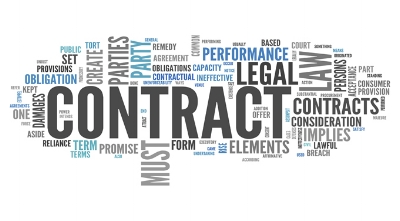Recently, I was talking with a family member about his business. We segued into a dispute he had with a buyer, who refused to pay. As we were discussing the details, he said five dreaded words: “We didn’t have a contract.” These words make me cringe for two reasons: (1) because you should always have a written contract; and (2) even when you don’t have a written contract, you still have a contract.
As a business law attorney, I run across a number of people who believe that they have an enforceable contract when they don’t; and an equal number of people who believe they don’t have a contract when they do. Because there are so many agreements that we enter into every day, it is important to understand how a contract is formed.
Believe it or not, we are entering into contracts all day every day. A contract consists of three simple things: (1) an offer; (2) an acceptance of that offer, and (3) some consideration exchanged between the parties. The process does not need to be formal or written to be considered a contract. However, there are certain contracts that need to be in writing in order for the court to enforce the terms.
These contracts, like contracts for the sale of real estate or contracts for the sale of goods of $500 or more, must be in writing and signed by the person you want to hold accountable. In other words, if you don’t get these contracts in writing, you can’t rely on just a breach of contract claim when you sue the other party. There are other quasi-contract theories that you may be able to use in your lawsuit, but you don’t want to depend upon those theories alone.
So, when should I have a written contract?
The short answer is always have a written contract, especially in high stakes situations and crucial deals. There are a thousand reasons to memorialize a verbal agreement in a written contract. The most obvious reason is to hold all of the parties accountable to the deal.
A written contract can also ensure that everyone understands what the deal actually is. As business owners, the goal is not to sue all of our clients and vendors. In fact, we do everything we can to avoid this result. Therefore, writing the terms of an agreement down allows the parties to review and ponder the implications of the agreement. Even the simple act of writing out the terms assigns a sense of formality to the agreement and increases compliance.
When asked why a business owner didn’t get a written contract, I usually get an answer like, “it was an informal agreement,” or “we are a small business and don’t need contracts.” Sadly, small businesses need even more protection because each and every dollar is crucial.
It is important to note that a contract does not need to be formal or full of legalese. In fact, the best contracts use plain language and a tone of camaraderie and respect. I like to include bullet points, bold headers, and familiar language in contracts. It is simply a matter of writing the most important terms down, anticipating scenarios, and getting both parties to sign it.
Megan Porth is the owner and managing attorney at Your Contract Shop. Megan was born and raised around entrepreneurs and business people. From a very young age, she was attending networking events, strategic planning meetings, and marketing seminars. Her passion for helping businesses grow inspired her to go to law school, where she graduated with honors. She currently owns her own business consulting firm in addition to being a practicing business law attorney.
Megan Porth is only licensed in Arizona. Any other work done through Your Contract Shop outside of Arizona will be done only with attorneys who are licensed or authorized to practice in that state.
*The materials provided in this article are for informational purposes only and not for the purpose of providing legal advice. Use of and access to this article does not create an attorney-client relationship between Your Contract Shop and the user. You should contact your attorney to obtain advice with respect to any particular issue or problem.

